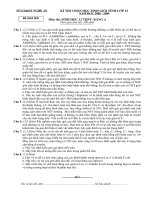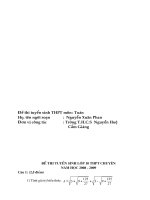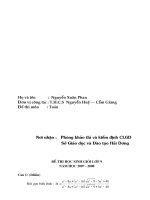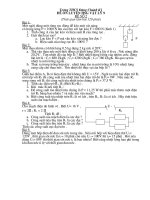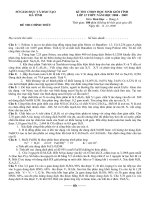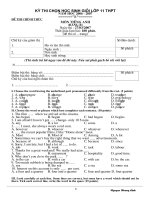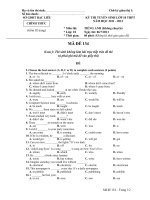Đề thi HSG tỉnh kèm hướng dẫn chấm
Bạn đang xem bản rút gọn của tài liệu. Xem và tải ngay bản đầy đủ của tài liệu tại đây (186.34 KB, 10 trang )
MÃ KÍ HIỆU
………………………………….
ĐỀ THI CHỌN HỌC SINH GIỎI LỚP 12
Năm học: 2014 - 2015
MÔN: TIẾNG ANH
Thời gian làm bài 180 phút
(Đề thì gồm ……trang)
PART I: LISTENING (3 POINTS)
I. Part 1: You will hear an interview with Minh Ha, a new champion in the Para Games. Listen and
answer the following questions (1 point)
Question 1-4: Listen carefully and decide whether the following statements are true (T) or false (F).
1. Minh Ha’s parents are her most eager supporters during the sporting event.
2. Though a disabled girl, Minh Ha was quite confident the first moment she practiced this sport.
3. Her second coach is her father.
4. She is getting married next month.
Your answers:
1. 2. 3. 4.
Question 5-10: Listen again and complete the summary of the interview
Minh Ha has just won a gold medal in (5) _____ . She became paralyzed because of an illness
when she was (6) _____ years old, yet she started practicing this sport only (7) _____ years ago. Her
first coach was her (8) _____, who used to win (9) _____ gold medals. Her second coach has been
working with her for (10) ______ years. Minh Ha hopes to win more gold medals in the future.
Your answers:
5. 6. 7. 8. 9. 10.
II. Part 2: Question 11-15. Listen to two students, Mary and Tom, discussing how to get school and
choose the best answer for each of the following questions. (1 point)
11. What does Mary want to get?
A. a new bicycle B. a fast bicycle
C. an inexpensive bicycle D. a stationary bicycle
12. Approximately how far away from school is Mary’s apartment?
A. a half mile B. a mile C. two miles D. four miles
13. Mary would save a lot of time if she had a bicycle but what is her problem?
A. she doesn’t have enough money to buy a new one.
B. she doesn’t like an expensive one.
C. she really likes a cheap one very much.
D. All are correct.
14. Why does Peter’s friend want to sell his old bicycle?
A. he doesn’t like it. B. It doesn’t work very well
C. it’s broken D. he got a new one.
15. What will Mary and Peter probably do next?
A. Go to see his friend’s bicycle B. See her new apartment
C. Walk to school D. Buy a new bicycle
Your answers:
11. 12. 13. 14. 15.
III. Part 3: Question 16-25. Listen to a talk by a man who works with animals, and fill in each blank
with ONE word. (1 point)
Today dogs are being trained in a (16) ______ of ways. One way that dogs are being trained
involves “smell”. For example, dogs are being trained to use their sense of smell to find (17)_____
persons, hidden frogs, or(18) ______ such as dynamite. Dog trainers have found that almost all types of
dogs have equally good sense of smell. Even though different types of dogs have (19) ______ senses of
smell, they aren’t equally good at different (20)______ . (21)______, certain types of dogs are better at
certain tasks because of other (22) _____ they have. For example, beagles are small and friendly, so
they’re often used at crowded airports to smell for (23) ______ food products in luggage. German
(24)______ have quick reactions, so they’re often used to smell for explosives such as dynamite.
(25)______ retrievers work well in the cold, so they’re often used to find people lost in the snow.
Your answers:
16. 17. 18. 19. 20.
21. 22. 23. 24. 25.
PART II: PHONETICS (1 POINT)
Choose the word whose stress pattern is different from that of the other words in the same group.
Write your answer in the numbered box.
1. A. commentary B. original C. industry D. mischievous
2. A. geographic B. geologic C. trigonometry D. titanic
3. A. television B. suggestion C. provision D. procedure
4. A. possibility B. Industrial C. revelation D. entertain
5. A. passenger B orchestrate C. flamingo D. nightingale
Your answers:
1. 2. 3. 4. 5.
PART III: VOCABULARY AND GRAMMAR (6 POINTS)
I. Choose the best answer to fill in each gap. Write your answer in the numbered box. (2 points)
1. “How kind, you shouldn’t have bothered.” – “______”
A. It was nothing, really B. Don’t worry, I didn’t bother
C. Why not? I was happy D. It was a very good thing
2. “ There’s a baseball game tonight?” – “______”
A. Great. Let’s go B. I’m not a real fan of hers
C. Don’t mention it D. Thanks. I’d love to
3. Larry drove all night to get here for his sister’s wedding. He _____ exhausted by the time he arrived.
A. must have been B. could have been
C. ought have been D. would have been
4. Marine reptiles are among the few creatures that are known to have a possible life span greater than
______ .
A. man B. the man’s C. the one of man’s D. that of man
5. Jack ______ yet, otherwise he would have telephoned me.
A. mustn’t have arrived B. shouldn’t have arrived
C. can’t have arrived D. needn’t have arrived
6. “How about an evening riverboat tour?” – “______”
A. No, it is good to do so.
B. Actually, I’ve never gone on an evening riverboat tour.
C. No. I’ve never gone on an evening riverboat tour.
D. Actually, I’ve gone twice this week.
7. Only when you grow up ______ the truth.
A. you will know B. you know C. do you know D. will you know
8. Don’t try too hard. Don’t ______ off more than you can ______ .
A. eat/ chew B. bite/ swallow C. bite/ chew D. eat / swallow
9. Well I’m sorry, that’s all I can offer you. ______
A. Take it or forget it B. Get it or forget it
C. Take it or leave it D. Leave it or take it
10. We put his rude manner ______ ignorance of our British customs.
A. off at B. up with C. up to D. down to
11. The advanced course in literature ______ French.
A. turned off me B. turned me away C. turned me off D. turned me against
12. His success can be put ______ his cleverness and good luck.
A. up to B. down to C. forward D. on
13. Prizes are awarded ______ the number of points scored.
A. according to B. because of C. adding up D. resulting in
14. The World Bank has criticized Britain for not giving enough financial ______ to developing
countries.
A. allowance B. aid C. loan D. provision
15. The early settlers were completely ______ on the harvest to see them through the winter.
A. dependant B. depended C. dependent D. dependable
16. Smoking is ______ forbidden everywhere in that factory.
A. strictly B. hardly C. severely D. harshly
17. During the starvation, we used to keep a ______ of dried food in the factory.
A. conserve B. substitute C. reserve D. preserve
18. It is illegal to ______ on grounds of race, sex, or religion.
A. discriminate B. differentiate C. certify D. differ
19. Crops are often completely destroyed by ______ of locusts.
A. bands B. troupes C. swarms D. flocks
20. “Would you like another coffee?” – “ ______ .”
A. I’d love one B. Willingly C. Very kind of your part D. It’s a pleasure
Your answers:
1. 2. 3. 4. 5. 6. 7. 8. 9. 10.
11. 12. 13. 14. 15. 16. 17. 18. 19. 20.
II. Supply the correct form of the words in brackets to complete the following passage. Write your
answer in the numbered box. (2 points)
BOOK REVIEW: WALLS HAVE EARS BY MARK MITCHELL
Avid reader of mark Mitchell’s critically acclaimed historical novels will not be disappointed
by his (1. LATE) ______ offering, Walls have Ears, a simple, but (2. BEAUTY) ______ written tale
of childhood innocence in a world of adult corruption. Mitchell, a former history teacher, shot to fame
three years ago thanks to the television (3. ADAPT) ______ of his fourth noel, Baroque of Ages, which
followed the fortunes of two teenage siblings in seventeenth-century Britain. Despite the author’s (4.
SATISFY) ______ with the TV production, (5. STAR) ______ Marian Blackshaw and Edek Sobera, it
was a hyge success and (6. SELL) ______ of his books for children rocketed overnight as a result.
Walls hav Ears is a (7. VARY) ______ on the central theme of Baroque of Ages, though this time set
against the background of Hadrian’s Wall during its construction in the second century. The chance (8.
DISCOVER) ______ by two young friends of a plot to assassinate the Roman Emperor responsible for
the defensive wall turns their world upside down. The children are sworn to secrecy, but their
conscience (9. THREAT) ______ to get the better of them. (10. HISTORY) ______ have criticized
Mitchell for being too liberal with the facts, but this will not deter his young fans from queuing up for
their copy of the book when it is released on June 20
th
.
Your answers:
1. 2. 3. 4. 5.
6. 7. 8. 9. 10.
III. Supply the correct form of the VERB in brackets to complete the passage. Write your answer in
the numbered box.(1 point)
It was announced in London this morning that the British Oil Corporation has discovered oil
under the sea near the Welsh coast. The company, which (1. DRILL) _____ for oil in the area since
2001, (2. FIND) ______ small amounts of oil near Swansea last month, and since then has discovered
larger amounts under the seabed nearby. Last year the government lent over $ 50,000,000 to BOC, and
gave permission for the company to build an oil refinery and other facilities in South Wales. The
reaction of local people to today’s news (3. BEE) _____ mixed so far. Local MPs have already
welcomed the news, pointing out that the oil industry will bring badly needed jobs to the area. But local
residents are worried about the danger of pollution. “Nobody (4. ASK) _____ us yet what we want,”
said Ann Griffiths, leader of the Keep Out The Oil Campaign. “Look what (5. HAPPEN) _____ when
they (6. FIND) ______ oil in Scotland in the 1960s. The oil companies (7. GET) ______ rich, not the
local people. BOC (8. NOT TELL) ______ us the truth about what this is going to mean for our
people.” A BOC spokesman later (9. REFUSE) ______ to comment. Meanwhile local campaigners
(10. ASK) ______ the government to hold an inquiry.
Your answers:
1. 2. 3. 4. 5.
6. 7. 8. 9. 10.
IV. Find out and correct the mistake in each sentence. Write your answer in the numbered box. (1
point)
1. No cactus has flowers most beautiful or fragrant than those of the night blooming cereus.
A B C D
2. Since ancient times, some people wore amulets, objects that are supposed to give the wearer magical
A B C D
powers.
3. The Franklin stove, which became common in the 1780s, burned wood more efficiency than an open
A B C D
fireplace.
4. The main rotor and tail rotor of a helicopter make the same job as the wings, propellers, and rudder
A B C D
of an airplane.
5. Because they are so secretive, blind snakes are seldom seen, and its habits are not well-known.
A B C D
6. Paul Revere designing the metal plates on which the first paper money in the United States was
A B C D
printed.
7. That Columbus was not the first man to set foot on the New World were unknown to many people.
A B C D
8. The Nobel Prize for Physics is one of the six prizes awarded annually by the Nobel foundation for
A B
outstanding achievement in the field for Physics.
C D
9. The man I introduced you to him last night may be the next president of the university.
A B C D
10. After the civil war, a wave of new immigrants in the United States arrived, included Italy, Spain,
A B C D
Greece, Poland, Russia, and China.
Your answers:
1. 2. 3. 4. 5.
6. 7. 8. 9. 10.
PART IV: READING COMPREHENSION (6 POINTS)
I. Read the passage below and decide which answer (A, B, C or D) best fits each gap. Write your
answer in the numbered box. (2 points)
The complexities involved in captive breeding of animals are evident in the case of the golden
marmoset. Since 1965 scientists have been trying to improve the breeding success of the golden
marmosets at the Smithsonian’s National Zoological Park in Washington, D.C.
In (1) _____ attempts at the National Zoo and other institutions, the zoologists found that (2)
_____ marmosets were ignored, abused, and sometimes inadvertently (3) _____ their offspring. After
considerable observation, the scientists (4) _____ that both the male and female have to have
experience (5) _____ with and helping to care for younger siblings (6) _____ they themselves become
sexually mature – that is, marmosets can successfully rear their young (7) _____ if they have had early
experience in a family situation. The researchers learned that if young marmosets are left with their
family groups for too long – four or five years – they are (8) _____ to breed. Other research showed
that the animals needed special diets if they were producing offspring. (9) _____ of the carbohydrate –
rich fruit diet they were (10) _____ fed, they required a menu high in protein.
1. A. rare B. fact C. which D. early
2. A. captive-born B. wild C. premature D. mature
3. A. refused B. killed C. executed D. murdered
4. A. thought B. experienced C. felt D. learned
5. A. captive B. mature C. breeding D. living
6. A. when B. before C. therefore D. and
7. A. only B. since C. siblings D. animals
8. A. unlikely B. incapable C. supposed D. able
9. A. Instead B. Because C. Some D. Most
10. A. daily B. really C. properly D. customarily
Your answers:
1. 2. 3. 4. 5.
6. 7. 8. 9. 10.
II. Read the passage and choose the correct options. Write your answer in the numbered box. (2
points)
Millions of people are using cell phones today. In many places, it is actually considered unusual not
to use one. In many countries, cell phones are very popular with young people. They find that the
phones are more than a means of communication - having a mobile phone shows that they are cool and
connected. The explosion in mobile phone use around the world has made some health professionals
worried. Some doctors are concerned that in the future many people may suffer health problems from
the use of mobile phones. In England, there has been a serious debate about this issue. Mobile phone
companies are worried about the negative publicity of such ideas. They say that there is no proof that
mobile phones are bad for your health. On the other hand, medical studies have shown changes in the
brain cells of some people who use mobile phones. Signs of change in the tissues of the brain and head
can be detected with modern scanning equipment. In one case, a traveling salesman had to retire at
young age because of serious memory loss. He couldn't remember even simple tasks. He would often
forget the name of his own son. This man used to talk on his mobile phone for about six hours a day,
every day of his working week, for a couple of years. His family doctor blamed his mobile phone use,
but his employer's doctor didn't agree. What is it that makes mobile phones potentially harmful? The
answer is radiation. High-tech machines can detect very small amounts of radiation from mobile
phones. Mobile phone companies agree that there is some radiation, but they say the amount is too
small to worry about. As the discussion about their safety continues, it appears that it's best to use
mobile phones less often. Use your regular phone if you want to talk for a long time. Use your mobile
phone only when you really need it. Mobile phones can be very useful and convenient, especially in
emergencies. In the future, mobile phones may have a warning label that says they are bad for your
health. So for now, it's wise not to use your mobile phone too often.
1. According to the passage, what makes mobile phones potentially harmful is ______.
A. their radiant light B. their power of attraction
C. their raiding power D. their invisible rays
2. According to the writer, people should ______.
A. only use mobile phones in urgent cases B. only use mobile phones in medical emergencies
C. keep off mobile phones regularly D. never use mobile phones in all cases
3. The most suitable title for the passage could be ______.
A. “The Reasons Why Mobile Phones Are Popular”
B. “The Way Mobile Phones Work”
C. “Technological Innovations and Their Price”
D. “Mobile Phones: A Must of Our Time”
4. According to the passage, cell phones are especially popular with young people because ______.
A. they are indispensable in everyday communications
B. they make them look more stylish
C. they keep the users alert all the time
D. they cannot be replaced by regular phones
5. Doctors have tentatively concluded that cell phones may ________.
A. damage their users’ emotions B. change their users’ temperament
C. cause some mental malfunction D. change their users’ social behaviors
6. The man mentioned in the passage, who used his cell phone too often, ______.
A. suffered serious loss of mental ability B. could no longer think lucidly
C. abandoned his family D. had a problem with memory
7. The changes possibly caused by the cell phones are mainly concerned with ______.
A. the mobility of the mind and the body B. the arteries of the brain
C. the smallest units of the brain D. the resident memory
8. The word "means" in the passage most closely means ______.
A. meanings B. expression C. method D. transmission
9. The word "potentially" in the passage most closely means ______.
A. possibly B. obviously C. certainly D. privately
10. "Negative publicity" in the passage most likely means ______.
A. information on the lethal effects of cell phones
B. poor ideas about the effects of cell phones
C. the negative public use of cell phones
D. widespread opinion about bad effects of cell phones
Your answers:
1. 2. 3. 4. 5.
6. 7. 8. 9. 10.
III. Read the passage and fill in each numbered blank with ONE suitable word (2 points)
One of the main problems facing the environmental movement is that it may become a victim of
its own success. It is now generally accepted that issues such as global warning need to be (1)____ with
seriously, and that the Scandinavian forests are being destroyed (2) _____ to the effects of (3)
_____rain. Views (4) _____ these have now become an accepted part of the political scene, and
consumers are constantly bombarded with green or (5) _____ friendly products. However, this does not
mean that environmental groups can now afford to relax. On the (6) _____ , the green movement must
consider how the momentum will (7) ____ sustained when the current enthusiasm has (8) _____ . The
environment must not be (9) ______ to fade from people’s minds, because the progress of ecological
collapse has already been (10) _____ in train , and so far very little has been done to reverse it.
Your answers:
1. 2. 3. 4. 5.
6. 7. 8. 9. 10.
PART V: WRITING (4 POINTS)
I. Rewrite each of the sentences without changing its meaning, using the cue given. (1 point)
1. “Without the rapid growth in population there would be fewer food shortage.”
=> He blamed
2. Although he was very tired, he agreed to play tennis.
=> Tired
3. It was wrong of you to scare your mother like that.
=> You oughtn’t
4. It is said that he escaped to a neutral country.
=> He
5. The truth only came out on the publication of the general’s personal diaries.
=> Only when
6. The completion of the work was scheduled for last week.
=> The work was to
7. The number of road accidents has soared in recent months.
=> There
8. Everyone was exhausted apart from Sally.
=> With
9. In spite of her initial reluctance to take the job, she’s got on very well.
=> Reluctant
10. No matter how hard I tried, I couldn’t open the door.
=> Try
II. Rewrite the following sentences, using the exact words in brackets. (1 point)
1. He didn’t mention our previous conversation at all. (REFERENCE)
=>
2. I don’t feel like going to the party. (MOOD)
=>
3. Selling antiques made him a little extra money. (DABBLED)
=>
4. Don’t panic about something so trivial. (MOUNTAIN)
=>
5. He is different from his brother in almost all respects. (BEARS)
=>
III. Essay writing (2 points)
Some people think that family is the most important influence on young adults. Other people
think that friends are the most important influence on young adults. Which view do you agree with?
Use examples to support your opinion.(You should write at least 200 words.)
MÃ KÍ HIỆU
………………………
HƯỚNG DẪN CHẤM ĐỀ THI CHỌN HỌC SINH GIỎI LỚP 12
Năm học: 2014 – 2015
Môn: Tiếng Anh
(Hướng dẫn chấm gồm 4 trang)
PART ANSWERS MARK
LISTENING
(3 POINTS)
Part 1:
Question 1-10
1. F 0.1 P
2. F 0.1 P
3. F 0.1 P
4. T 0.1 P
5. swimming 0.1 P
6. three 0.1 P
7. nine 0.1 P
8. mother 0.1 P
9. three 0.1 P
10. two 0.1 P
Part 2:
Question 11-15
11. C 0.2 P
12. C 0.2 P
13. A 0.2 P
14. D 0.2 P
15. A 0.2 P
Part 3:
Question 16-25
16. variety 0.1 P
17. missing 0.1 P
18. explosives 0.1 P
19. equivalent 0.1 P
20. tasks 0.1 P
21. however 0.1 P
22. characteristics 0.1 P
23. illegal 0.1 P
24. shepherds 0.1 P
25. golden 0.1 P
PHONETICS
(1 POINT)
Choose the word
whose stress
pattern is
different from
that of the
others
1. B 0.1 P
2. D 0.1 P
3. A 0.1 P
4. B 0.1 P
5. C 0.1 P
VOCABULARY
AND GRAMMAR
(6 POINTS)
I. Choose the
best answer to
fill in each gap
(2 points)
1. A 0.1 P
2. A 0.1 P
3. A 0.1 P
4. D 0.1 P
5. C 0.1 P
6. D 0.1 P
7. D 0.1 P
8. C 0.1 P
9. C 0.1 P
10. D 0.1 P
11. C 0.1 P
12. B 0.1 P
13. A 0.1 P
14. B 0.1 P
15. C 0.1 P
16. A 0.1 P
17. C 0.1 P
18. A 0.1 P
19. C 0.1 P
20. A 0.1 P
II. Supply the
correct form of
the words in
brackets to
complete the
passage
(2 points)
1. latest 0.1 P
2. beautifully 0.2 P
3. adaptation 0.2 P
4. dissatisfaction 0.2 P
5. starring 0.2 P
6. sales 0.2 P
7. variation 0.2 P
8. discovery 0.2 P
9. threatens 0.2 P
10. historians 0.2 P
III. Supply the
correct form of
the VERB in
brackets to
complete the
passage
(1 point)
1. had been drilling 0.1 P
2. found 0.1 P
3. has been 0.1 P
4. has asked 0.1 P
5. happened 0.1 P
6. found 0.1 P
7. got 0.1 P
8. hasn’t told 0.1 P
9. refused 0.1 P
10. have asked 0.1 P
IV. Find out and
correct the
mistake in each
sentence
(1 point)
1. B => more beautiful 0.1 P
2. B => have worn 0.1 P
3. C => efficiently 0.1 P
4. B => makes 0.1 P
5. C => their 0.1 P
6. A => designed 0.1 P
7. C => was 0.1 P
8. D => of 0.1 P
9. B => to 0.1 P
10.D => including 0.1 P
READING
COMPREHENSION
(6 POINTS)
I. Read the
passage below
and decide
which answer
best fits each
gap
(2 points)
1. D 0.2 P
2. A 0.2 P
3. B 0.2 P
4. D 0.2 P
5. D 0.2 P
6. B 0.2 P
7. A 0.2 P
8. A 0.2 P
9. A 0.2 P
10.D 0.2 P
II. Read the
passage and
choose the
correct options
(2 points)
1. D 0.2 P
2. A 0.2 P
3. C 0.2 P
4. B 0.2 P
5. C 0.2 P
6. D 0.2 P
7. C 0.2 P
8. C 0.2 P
9. A 0.2 P
10. D 0.2 P
III. Read the
passage and fill
in each
numbered blank
with ONE
suitable word
1. delt
2. due 0.2 P
3. acid 0.2 P
4. like 0.2 P
5. environmentally 0.2 P
6. contrary 0.2 P
7. be 0.2 P
8. passed 0.2 P
9. allowed/ permitted 0.2 P
10. set 0.2 P
WRITING
(4 POINTS)
I. Rewrite each
of the sentences
without
changing its
meaning, using
the cue given
(1 point)
1. He blamed the food shortage on the
rapid growth in population. / He blamed
the rapid growth in population for the food
shortage.
0.1 p
2. Tired though/ as he was, he agreed to
play tennis.
0.1 p
3. You oughtn’t to have scared your
mother like that.
0.1 p
4. He is said to have escaped to a neutral
country.
0.1 p
5. Only when the general’s personal
diaries were published did the truth come
out. // Only when they published the
general’s diaries did the truth come out.
0.1 p
6. The work was to have been completed
last week.
0.1 p
7. There has been a huge/ dramatic
increase in the number of road accidents.
0.1 p
8. With the exception of Sally, everyone
was exhausted
0.1 p
9. Reluctant though/ as she was to take the
job, she’s got on very well.
0.1 p
10. Try as hard as I might, I couldn’t open
the door.
0.1 p
II. Rewrite the
following
sentences, using
the exact words
in brackets
(1 point)
1. He made no reference to our previous
conversation.
0.1 p
2. I am not in the right mood for going to
the party. // I am in no mood to go/ for
going to the party.
0.1 p
3. He dabbled in antiques, which made
him a little extra money. // He made a little
extra money as/ because he dabbled in
antiques.
0.1 p
4. Don’t make a mountain out of a
molehill.
0.1 p
5. He bears little/ hardly any resemblance
to his brother.
0.1 p
III. Essay
writing
(2 points)
1. Content:
a. Providing main ideas and details
b. Communicating intentions sufficiently
and effectively
1 p
2. Organization and presentation:
a. Ideas are well-organized and presented
with coherence, cohesion, and clarity.
b. The paragraph is well-structured.
0.25 p
3. Language:
a. Variety of appropriate vocabulary and
structures
b. Good use of grammatical structures
0.5 p
4. Handwriting, punctuation, and spelling:
a. Intelligible hand writing
b. Good punctuation and no spelling
mistakes
0.25 p
